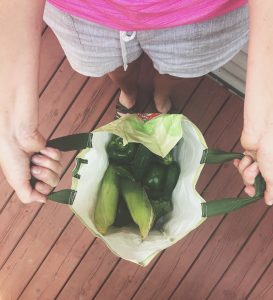By Madison Ostrander ’18 and Eighth Day Farm Intern
Try to picture just over 1 billion elephants roaming around. Maybe at first the elephants would be a fun novelty, but I’d be willing to bet after a short while we’d have had enough, with things getting dangerous and crowded.
This bizarre scenario relates to the dilemma our country is facing with plastic waste: The weight of plastic waste we’ve produced equates to the weight of just over 1 billion elephants.

However, since the breakdown of plastic can take up to 400 years, an elephant relocation plan might be an easier problem to solve.
For instance, although a small amount of plastic is recycled, repurposed, or burned, most plastic ends up in landfills. Even 25 percent of plastics deposited in a single-stream recycling systems is redirected to the dump.
Elsewhere, the sharp increase of plastic production has dangerously littered our oceans, hurting those inhabiting it.
So, let’s address the elephant(s) in the room. As consumers, each of us is responsible for driving the increase in plastic production. But that doesn’t mean we can’t start making a positive impact now. While waste management innovations are being studied on a larger scale, we can each make a difference by choosing to avoid the use and purchase of plastic when possible, especially by avoiding single-use plastic convenience items.
Making the following switches can be an adjustment. But if we start looking at plastic packaging as elephants we don’t want in our backyards, foregoing a few conveniences we’ve grown used to might be easier. Try the following easy switches to reduce your negative impact:
1. Say goodbye to plastic grocery bags. Reuse saved plastic grocery bags or take reusable totes to the grocery store. Apply this to retail shopping too. Some stores will even honor your environmental efforts with a small discount.
2. Carry an insulated beverage container. You can save more than $100 per year by striking water bottles off your grocery list. And your insulated container works great for to-go coffee, too; you can enjoy both a clear conscious and hotter coffee for longer with this eco-friendly alternative.
3. Kindly return wrapped straws at restaurants to your server.
4. Limit the plastic-packaged food you purchase, including produce. The farmers market is a great place to start with unpackaged produce.
5. Find alternatives to plastic-packaged cosmetic products. Look for bar soap, shampoo bars, or products sold in non-plastic containers.
Challenge your friends and family to see who can make the most switches by the end of summer, and keep the conversation going by sharing your own ideas to tackle this elephant-sized problem.
Madison Ostrander is an intern at Eighth Day Farm, a local urban farm focused on creation care and natural growing practices, and a recent business and writing graduate from Hope College.
Environmental Awareness/Action: Environmental education and integrating environmental practices into our planning will change negative outcomes of the past and improve our future.
Living Sustainably is a collection of community voices sharing updates about local sustainability initiatives. It is presented by the Holland-Hope College Sustainability Institute, a joint project of Hope College, the City of Holland and Holland Board of Public Works. Go to www.hope.edu/sustainability-institute for more information.